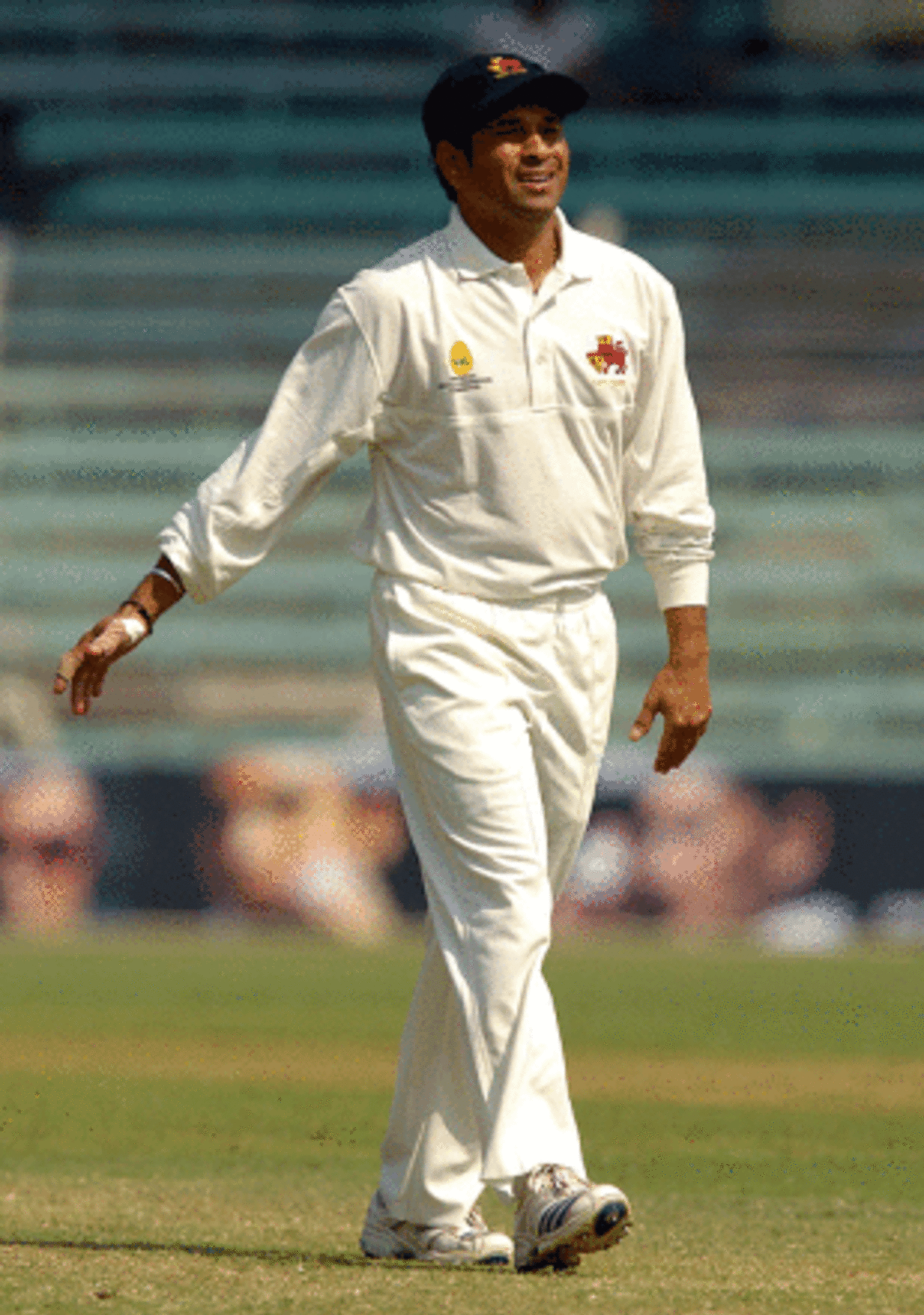Tendulkar's Mumbai roots
In his first three first-class innings for Mumbai, Sachin Tendulkar made 247 runs. Former Mumbai team-mates share their memories of a prodigy
Amol Karhadkar
10-Oct-2013

Sachin Tendulkar announced his talent early on with a string of good scores for Mumbai • ESPNcricinfo Ltd
Even before Sachin Tendulkar made his first-class debut against Gujarat at the age of 15 almost a quarter of a century ago, he was considered a boy wonder on the maidans of Mumbai. Yet, the ease with which Tendulkar graduated to the next level was astonishing for his seniors at the time.
Sulakshan Kulkarni, Mumbai's coach for the last two seasons, was one of them. In fact, Kulkarni had been supposed to bat at No 4 in Sachin's debut match. However, once the captain Lalchand Rajput and Alan Sippy put on a 159-run partnership for the second wicket, the batting order was changed. In walked the schoolboy and, until Tendulkar returned to the dressing room after an unbeaten century, Kulkarni was kept waiting.
Kulkarni had been surprised with the power Tendulkar had generated in his stroke-making, especially after what he had seen during a Kanga League match while playing for Karnatak Sporting Association against Tendulkar's Shivaji Park Youngsters.
"Our (KSA's) attack boasted of a couple of Ranji seamers, so it was a tough task for anyone but Tendulkar was flawless in his defence," Kulkarni said. "He showed remarkable temperament for a 14 or 15-year-old. Cut to Ranji Trophy, and the kind of power he was producing in his drives gave no indication of his age. He was ready for the big league."
By the time the new ball was taken by Gujarat captain Dhansukh Patel, Tendulkar had passed fifty. And soon after, he was involved in a run-out with Rajput, who missed his century by a one run. "I told him, 'Don't worry about me, you get a hundred'. And he got a hundred on debut," said Rajput, now the India A coach.
Any other youngster may have been distracted after a run-out that dismissed his captain on 99. Not Tendulkar. In fact, he changed his tempo to such a degree that he "raced" to century.
"It was a quick century, and was the need of the hour since the league games used to be three-day affairs then," Kulkarni said. "Some of the square drives he played were amazing. And I will never forget the manner in which he completed his century - a cover drive that sped through the inner ring of fielders to the fence."
Tendulkar's mettle was tested again in the next match against Saurashtra. Playing away from home, Bombay lost Rajput and Sippy with no runs on the board. Tendulkar then bailed them out with a 133-run stand with opener Shishir Hattangadi. In the second innings, the pair put on 81 runs with Tendulkar batting at No 3.
"The wicket had started deteriorating when he walked towards the crease. Left-arm spinner Virbhadra Gohil was bowling," Hattangadi recalled. "While crossing me at the non-striker's end he asked, 'Udatoy ka? (Is the ball bouncing?)'. I replied, 'Udat naahiye, waltoy' (it's turning, not bouncing). He was dropped off the first ball at covers and then, by the time the over ended, he would have been batting on 20 or so. It was jaw-dropping."
While he was mature beyond his years on the field, he was a typical teenager in many ways off it. During the away game, Tendulkar shared a room with Suru Nayak, the senior most member of the squad. "He could sleep all through the night during the match. He would keep on mumbling something about batting the whole night. He was obsessed with cricket," Nayak, now BCCI's cricket operations manager, said.
Nayak recalled an incident during the team's train journey back from Rajkot. "He was carrying a diary and he walked up to each and every member of the squad and noted down our addresses and telephone numbers so that he could get in touch with us if required," he said.
Hattangadi summed up the impressions the teenager had on the team. "At an age when we're worried whether our child is ready to cross the road on his own, he [Tendulkar] was ready to take on the world," Hattangadi said. "He was an affable young boy. All of us were convinced in those first two weeks that he was a special talent and we hoped that the talent wouldn't be hampered by luck, injury and destiny. I don't think he has let us down even a wee bit."
Amol Karhadkar is a correspondent at ESPNcricinfo